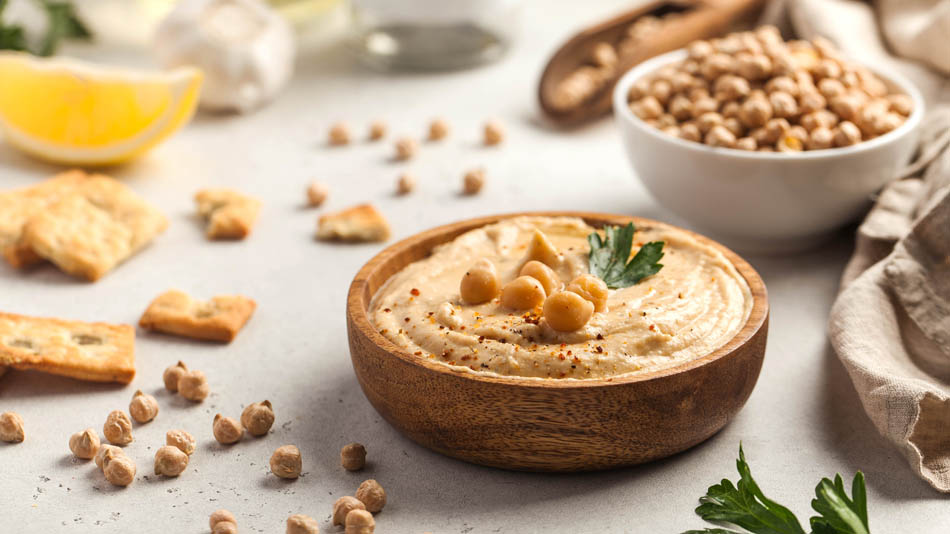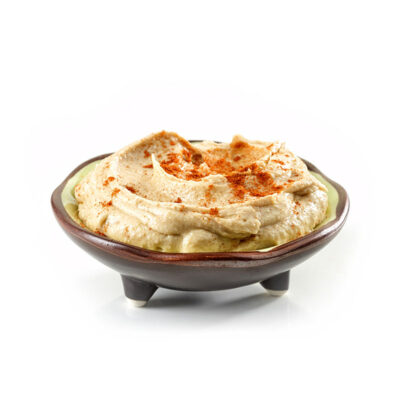Is Hummus Good for Diabetes? Benefits of the Popular Snack
When you have diabetes, certain foods can raise your blood sugar levels and cause health complications. Find out whether hummus makes a diabetes-friendly snack as we review the nutrition facts, glycemic index, and possible benefits.

People with diabetes need to maintain stable blood glucose levels. Certain foods support this stability, while others cause rapid blood glucose spikes. Before eating a particular food, it’s critical to question its nutritional content.
Hummus is a famous dip, spread, and savory dish that has become extremely popular all over the world. It has a complete macronutrient profile, with carbs, protein, fiber, and healthy fats. The question is: is it a safe bet for people with diabetes?
Keep reading as we bring you everything you need to know about hummus for diabetes.
Is Hummus Good for Diabetes?
Yes, hummus makes a great diabetes snack. It has a super low glycemic index that won’t trigger spikes in blood glucose. Hummus is digested more slowly than other carbs, causing a gradual rise in blood sugar content. It is loaded with important nutrients, including heart-healthy monounsaturated fats that the ADA recommends for people with diabetes.
Hummus is a perfect source of plant protein. A plant-based diet can benefit people with diabetes as it may improve insulin sensitivity and promote weight loss. The fiber content also encourages weight maintenance and blood sugar control.
Does hummus raise blood sugar?
No, eating hummus will not raise your blood sugar. In fact, it can support healthy blood sugar levels. Chickpeas and other legumes are considered low glycemic foods. As hummus is mainly made from chickpeas, it has a low glycemic index (GI). Foods with a low GI do not cause spikes in blood glucose.
What Is Hummus?
Hummus is a delicious dip made from mashed chickpeas, olive oil, tahini, garlic, lemon juice, and other spices. It is a Middle Eastern dish traditionally eaten with pita bread, but it is incredibly versatile. Many people eat hummus with vegetables, chips, and whole-grain crackers. It also works as a sauce or dressing in pasta dishes and salads.
Hummus is a simple and healthy addition to your diet as it is full of vitamins and minerals. It is an excellent source of plant-based protein and is free from common food allergens, making hummus a superb choice for most people.
Hummus Nutritional Value
Hummus is packed with essential nutrients. It provides a marvelous source of dietary fiber, healthy fats, and protein. Although a nutrient-rich snack, hummus is a high-calorie food. It’s easy to polish off a tub, so be mindful of your serving size to keep track of your calories.
Below is the nutritional value of a 100g serving of hummus.

It’s worth noting that hummus also provides plenty of other vitamins and minerals, including manganese, copper, folate, calcium, magnesium, and phosphorus.
Glycemic index of hummus
The glycemic index of hummus is 6, making hummus a very low-GI food. Hummus doesn’t spike your blood sugar like other high-carb foods despite the relatively high carb content.
Thanks to chickpeas, hummus contains enough fiber and protein to help balance out your blood glucose levels.
Benefits of Hummus for Diabetes
There are several health benefits of hummus for people with diabetes. If it’s not already on your groceries list, here are 3 reasons to include hummus as part of your diabetes meal plan.
#1 Helps control blood sugar
Eating hummus improves appetite, satiety, and glycemic control. Incorporating hummus and its ingredients into the American diet can improve overall diet quality when replacing foods high in saturated fats.
People with diabetes can safely enjoy hummus without worrying about their blood sugars. Pairing hummus with diabetes-friendly vegetables makes an ideal low-carb snack.
#2 High in fiber
A 100-gram serving of hummus has 5.5g of fiber. Dietary fiber is essential for gut health. It supports digestion, prevents constipation, keeps you regular, and feeds the healthy bacteria in your gut.
For people with diabetes, a fiber-rich diet is great because it helps with blood glucose control and weight management – two vital elements of diabetes control. If you want to lose weight, fiber keeps you feeling full for longer as it travels slowly through the stomach.
#3 Protects against heart disease
Hummus is rich in heart-healthy monounsaturated fats. These fats are known as good fats because they help protect the heart by lowering LDL (bad) cholesterol levels and maintaining stable levels of HDL (good) cholesterol.
High LDL cholesterol levels, known as hypercholesterolemia, increase your risk of heart disease, stroke, and cardiovascular events. Swapping saturated fats for unsaturated fats can support heart health and reduce the common risk factors associated with heart disease.
FAQs
The best hummus for diabetes is the homemade variety. That way, you can track precisely what ingredients are going into it so you can calculate your macros. Store-bought hummus remains healthy, but it may contain more calories than the hummus you make at home.
Carrots and hummus make a filling and low-carb snack. Carrots and other non-starchy vegetables contain plenty of nutrients to support healthy blood sugar levels. Hummus is a low GI food with many health benefits for people with diabetes.
Eating hummus will not necessarily lower blood glucose levels, but it does help regulate them. Like chickpeas, hummus has a very low GI score. Low GI foods do not cause blood glucose spikes but produce a steady, gradual rise.
A Word From Our Nutritionist
Diabetes is a chronic disorder characterized by high blood glucose levels. These levels result from the body’s inability to make enough insulin or use the insulin effectively. Therefore, people with diabetes must monitor their diet to prevent rises in blood glucose.
Chickpeas and other legumes are staple foods in a diabetes diet, whether you have type 1, type 2, or gestational diabetes.
Hummus – a chickpea-based dip – ticks all the boxes for healthy diabetes management. It also has properties that reduce the risk of heart disease. Olive oil – a key ingredient in the hummus recipe – is an essential dietary source for lowering cardiovascular risk.
If you are following the keto diet for diabetes, remember that hummus is not keto-friendly. Outside of keto, it is an incredibly healthy food within a balanced diet. It is important to eat a variety of nutritious foods and get regular exercise to keep your diabetes under control.
Conclusion
Hummus makes a wonderful addition to a diabetes diet plan. It contains everything your body needs to maintain good health without spiking insulin levels. Plenty of research confirms hummus benefits glycemic control, insulin sensitivity, and healthy weight management.

















































 Select your language:
Select your language: 








